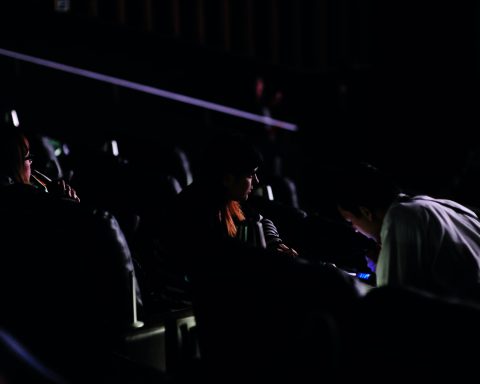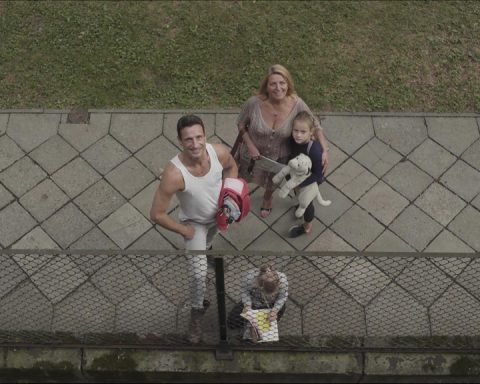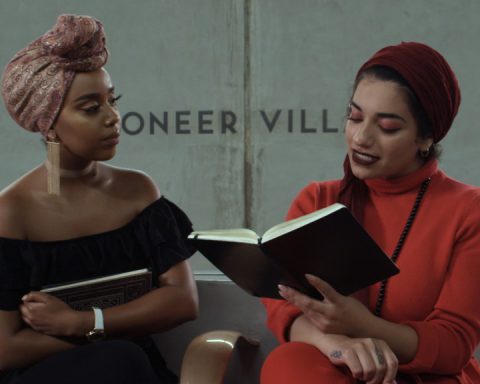It must have been the eyes of the boy nicknamed Courgette (“zucchini”). They reflect a life so brutal, but a hope so profound. He makes cities out of his mother’s discarded beer cans. He makes a happy, colorful kite out of his father’s abandonment – he’s now flying free from the life the boy’s been trapped in. Or maybe it’s because he’s flying free that the boy’s been trapped in the first place.
Or maybe it was the way they made the Franco-Swiss production. Directed by Claude Barras, 2016’s Ma Vie de Courgette (“My Life as a Zucchini”), is a feature-length piece of stop motion involving nine expert artists in the genre. In it, artists built actual, physical, non-digital sets and marionettes, and animated them frame by frame. They managed to combine their delicate, meticulous work with a deep, poignant plot from a novel.

Actually, I’d come to find out it was all of the above – and more – that ultimately sealed the deal for the DOK Leipzig organizers: They’ve chosen Courgette as the festival’s opening film this year. In its six-decade history, it’s the first time the fest picks an animated film rather than a documentary for opening honors.
It was even more of a remarkable feat considering that DOK Leipzig received a record number of submissions this year. The Selection Committee viewed about 3,300 films, and about 300 will be shown at the fest (between 31 October and 6 November). The majority of them are documentaries, which is what the fest is also mostly known for.
“My Life as a Zucchini” may be heralding new times, though.
Having had a preview and recent related interview, I’ve got some insights for you that may help explain the film’s appeal. So much appeal that, according to IMDb, it’s the Swiss selection for the 2017 Oscars for Best Foreign Language Film.
With Courgette as its protagonist, the film tells the story of a group of orphans or otherwise abandoned kids who find unlikely friends and lasting bonds through their very difficult upbringings. They’ve experienced more pain than most people in their entire lifetimes. The stop motion is skillful at capturing an array of feelings.
The abundance of colors and gentle shapes contrast with the bleak emotional scenario that initially underlies it. The outlook gradually improves. It’s like clouds slowly parting to reveal the sky – or the hair being delicately pulled back from someone’s facial scars.
The first scenes are striking, while being subtle. You never witness the full extent of Courgette’s mother’s abuse, but you can sense it. You know she dies, but you don’t see her dying. You get a glimpse into how complex the little boy’s psychological state is when he talks to his case officer. He insists on holding on to the nickname his mother gave him. He wants to keep being called by it.
The start at the orphanage is rough, especially in terms of bullying. But by standing up for himself, Courgette makes friends with the main bully (and leader of the group), and he opens up to Courgette and reveals to him his own and the other children’s heartbreaking stories. As in real life, all the characters look somehow alike, but all somehow different – as in the way their heads are shaped, the way their faces are scarred, the color of their hair and skin (for Courgette, there’s a lot of blue).
The girl with perhaps the worst story of all is the one who will steal Courgette’s heart, and help the other children find a depth of self-confidence and friendship they never knew before. The police officer who takes Courgette to the orphanage may serve as a bridge to a new, surprising way out of a life without a family.
This is an enriching movie experience parents may want to share with their children.
Besides its visual appeal, it may help illustrate and explain some topics that are tough to address, but which are necessary to learn as a human being.
Kudos also go to the soundtrack by Sophie Hunger. I especially like her closing song in the movie.
https://www.youtube.com/watch?v=AyUp1rnv7rY
I asked André Eckardt, curator for animated films at DOK Leipzig, how it came about that Courgette nabbed the spot at the DOK premiere. Its relatability for both adults and youths was definitely part of the reason:
“On the one hand, it has to do with the fact that there are not so many animated films with feature length [that are not geared at] family entertainment, so they don’t reach the festival. We are very picky and look for special films with a very good story or something which relates maybe to other topics in the festival. And this year, La Vie de Courgette was really a film we said, ‘Wow, ok, it might be interesting, it might be surprising for the outside to have this special film for the opening.’ Because it’s an animation and it also appeals to a younger audience in a certain way but it still, on a second level, tells a lot about life to an adult audience. It was high time to have an animation film as an opening film. It wasn’t difficult in any way to convince the others [as the curator for the section].”

He added that the DOK Leipzig organizers wanted to show that animated films are also a big part of the festival’s tradition. Another highlight is that this particular film – as I’ve described – represents a different engagement with the medium of animation than the highly entertaining digital films that usually make it big nowadays. Says Eckardt:
People return to analog, or to hand-made animation, because during this high time of digital animation sometimes the feel for the material got lost, [and] for gravity, for mistakes. [A film like Courgette] needed something with warmth.
The handmade puppets were a perfect fit for Courgette and its story, said Eckardt, who is also a film history and restoration enthusiast. He was looking forward to the audience hearing more details from the Courgette film-makers at DOK Leipzig.







